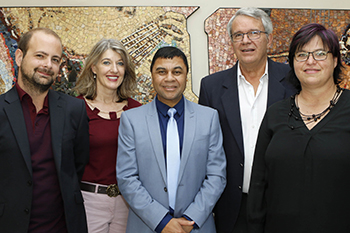
From left, NRF P-rated researcher,
Dr Daniel Spence; Directorate Research
Development, Eleanor van der Westhuizen;
Vice-Chancellor and Rector Prof Francis Petersen;
Dean of Faculty of Theology Prof Fanie Snyman;
and Vice-Rector: Research, Prof Corli Witthuhn.
Photo: Johan Roux
The University of the Free State’s (UFS) Vice-Rector: Research, Prof Corli Witthuhn, hosted a Research Celebration, at which the new National Research Foundation (NRF) ratings, presentation of the UFS Book Prize and the research support award were announced. The UFS Chancellor, Dr Khotso Mokhele, and Chairperson of the UFS Council, Mr Willem Louw, were in attendance among academics and staff members.
An astounding preface
Presenting the opening remarks, UFS Vice-Chancellor and Rector, Prof Francis Petersen, congratulated all researchers and prize recipients on behalf of the rectorate. He applauded all researchers who had put their best foot forward and were acknowledged by the NRF. Furthermore, Prof Petersen said that the success of UFS researchers informed that the university received international recognition. “Research has the ability to play an active role in transformative action that leads to change. We are striving to be a leader in research output,” said Prof Petersen.
Humble and gracious recipient
Prof Fanie Snyman, Dean of the Faculty of Theology, walked away with the most sought-after award of the day, the UFS Book Prize for Distinguished Scholarship, for his book, Malachi, on the last book of the Old Testament. The book was published in Germany and can be used by theology scholars and academics.
“I have no words, I am sincerely grateful for this award, but I must also thank the university. I am grateful for the support that has enabled me to complete the book and achieve this award,” said Prof Snyman. He is the third academic to be awarded this prize.
University reaches new heights
The university’s new NRF-ratings were celebrated. The UFS has 27 new rated researchers and seven researcher’s ratings were renewed. Prof Jonathan Jansen received a NRF A-rating and Dr Daniel Spence a P-rating.
The Directorate of Research Development’s Eleanor van der Westhuizen was awarded the Research Support Award, which is to acknowledge those who accelerate and propel research and/or researchers.